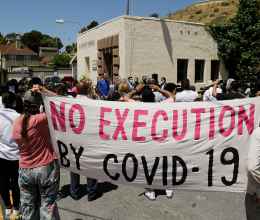Every morning in 2017, Rebecca Martinez woke up before dawn and reported to the Springer Correctional Center (SCC) kitchen, where she prepared food for her fellow incarcerated women. And every day her job supervisor, correctional officer Christopher Padilla, made vulgar sexual comments to her. On several occasions he touched her inappropriately. One day, Officer Padilla trapped Rebecca in a walk-in refrigerator and forced her to show him her breasts. He threatened to extend her prison time -- by taking away her rightfully-earned good time credits -- if she refused.
For months, Rebecca was terrorized by an employee of the state who had profound control over every aspect of her life. For months, she was afraid to report the abuse because she knew that women are often retaliated against by prison staff when they report sexual harassment and assault.
Even after several other women reported his abusive behavior, management did not discipline Officer Padilla.
Rebecca was not alone. Officer Padilla harassed and assaulted several other women at SCC whom he supervised, emboldened by the belief that he would never face consequences for his actions. Unspringsingly, when Rebecca finally worked up the courage to report Officer Padilla, prison staff retaliated against her.
Even after several other women reported his abusive behavior, management did not discipline Officer Padilla. In fact, shortly before Rebecca reported his abuse, Officer Padilla was promoted to a position of even greater power and access to the women at SCC, one which he held for almost three years after numerous women reported his inappropriate, abusive, and illegal behavior.
Three years after the first women courageously came forward, Officer Padilla was finally fired when his sexual assault of yet another woman came to light. For three years, Rebecca and Officer Padilla’s other victims had to live with the knowledge that Officer Padilla was roaming SCC emboldened and enabled by SCC leadership to continue abusing women. While Rebecca was transferred to another facility, many of Officer Padilla’s victims were unable to escape their abuser, who retained utter control over their lives.
It is well established under federal law that sexual abuse of incarcerated individuals is illegal and constitutes cruel and usual punishment. Thankfully, Officer Padilla finally faced consequences for his abuse, but he was not the only one responsible for what happened to his victims.
When Rebecca sued to vindicate her constitutional right to be free from abuse at the hands of state employees in federal court, she also named two of Officer Padilla’s supervisors and the SCC warden. SCC leadership were responsible for creating a culture of abuse at the prison by ignoring, dismissing, and mishandling allegations of sexual abuse and by retaliating against those courageous enough to report such abuse. Rebecca sought to hold them accountable for failing their constitutional, legal, and moral duty to protect her from violence and abuse. She hoped that doing so might prevent others from suffering the kind of trauma that she suffered.
Instead, the supervisory defendants were dismissed from Rebecca’s lawsuit after successfully arguing that they were protected by qualified immunity. This judge-made doctrine, invented by the United States Supreme Court in the late 1960’s, allows public officials who abuse their power to escape consequences so long as they did not violate “clearly established law.” This standard has been interpreted by federal courts to mean that public officials can’t be held accountable for violating someone’s rights unless in a previous lawsuit, with nearly identical facts, a similarly-accused defendant was found guilty of violating the same rights.
For too long, qualified immunity has shielded bad actors from liability and prevented survivors of abuse from seeking justice. But we can change that.
HB 4 would explicitly bar the defense of qualified immunity in state court.
The New Mexico Civil Rights Act, also known as HB 4, would allow New Mexicans to sue for violations of their rights under the New Mexico Constitution in New Mexico courts. While our state constitution offers robust protections that are even greater than those afforded in the United States Constitution, there is currently no way for individuals to sue for violations of most rights afforded in New Mexico’s constitution. Put simply, our rights are guarantees on paper only. This forces many New Mexicans, like Rebecca, to sue in federal court and contend with qualified immunity. HB 4 would explicitly bar the defense of qualified immunity in state court.
HB 4 is expected to be heard on the Senate floor this week. Legislators have a historic opportunity to empower victims of state violence to seek and obtain justice on the merits of their cases, rather than be forced to prove that their case is identical to another victim’s circumstances.
The legislature has the power to ensure the New Mexico Constitution is not just a hollow promise, but an avenue for securing fairness, equality, and justice for all New Mexicans.




